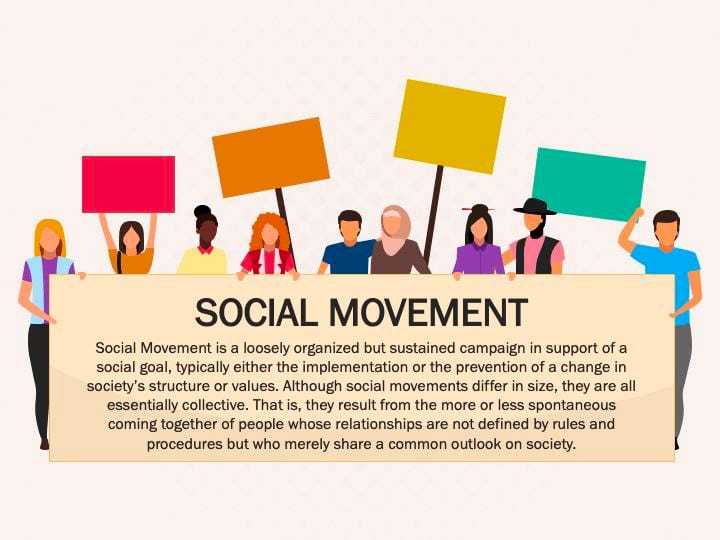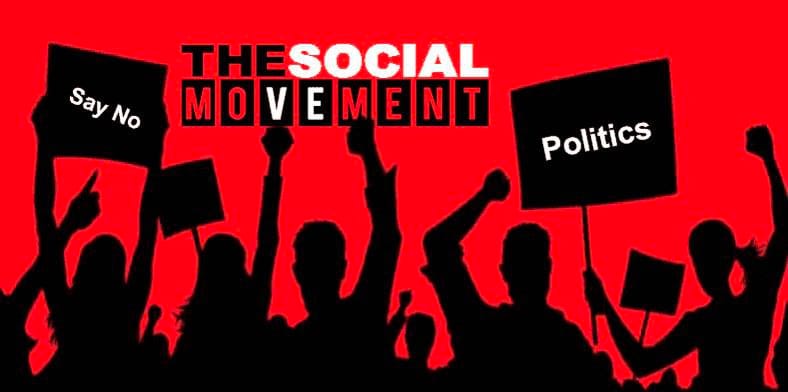
Social movements are collective efforts by groups of people to bring about or resist social, political, or economic change. They are organized activities that promote or oppose changes in society and typically emerge from the grassroots level, driven by a shared sense of dissatisfaction with current conditions and a desire for reform or revolution. Social movements often seek to influence public opinion, policy, and legislation, and they can take various forms, including protests, advocacy, campaigns, and other forms of activism.
Types of Social Movements
Social movements can be categorized in various ways based on their goals, methods, and scope.

Here are some common types:
1. Reform Movements
These movements seek to change specific laws, policies, or practices without altering the fundamental structure of society. They aim to work within the existing political system to bring about change.
- Examples: Civil Rights Movement, Women’s Suffrage Movement, Environmental Movement.
2. Revolutionary Movements
Revolutionary movements aim to completely overthrow and replace the existing social, economic, or political system. They often involve radical changes and may use more confrontational methods.
- Examples: American Revolution, Russian Revolution, Cuban Revolution.
3. Resistance Movements
These movements aim to resist or undo social changes that have already occurred. They often seek to preserve traditional values and institutions.
- Examples: Anti-globalization Movement, Religious Fundamentalist Movements.
4. Religious Movements
Religious movements seek to promote, spread, or restore particular religious beliefs and practices. They can be reformative, revolutionary, or reactionary in nature.
- Examples: Protestant Reformation, Islamic Revival Movements, Evangelical Movements.
5. Alternative Movements
These movements aim to bring about change by encouraging individuals to change their own behaviors and lifestyles. They often focus on personal transformation rather than large-scale social change.
- Examples: New Age Movement, Voluntary Simplicity Movement.
6. New Social Movements
New social movements focus on issues related to quality of life, such as environmentalism, human rights, and social justice. They often emphasize identity, culture, and lifestyle changes.
- Examples: LGBTQ+ Rights Movement, Environmental Justice Movement, Anti-nuclear Movement.
7. Labor Movements
Labor movements seek to improve conditions for workers and advocate for their rights, often through unions and collective bargaining.
- Examples: Trade Union Movement, Industrial Workers of the World, Fight for $15 Movement.
8. Nationalist Movements
Nationalist movements seek to promote the interests of a particular nation, often with the goal of achieving self-determination or independence.
- Examples: Indian Independence Movement, Palestinian National Movement, Quebec Sovereignty Movement.
9. Identity-based Movements
These movements advocate for the rights and recognition of specific identity groups, often focusing on issues of discrimination, equality, and representation.
- Examples: Feminist Movement, Black Lives Matter, Disability Rights Movement.
10. Global Movements
Global movements address issues that cross national boundaries and require international cooperation, such as climate change, human rights, and global justice.
- Examples: Global Climate Strike, Fair Trade Movement, World Social Forum.
Social movements play a important role in shaping the societies by advocating for change, raising awareness, and influencing policies. They reflect the dynamic nature of the social life and the ongoing struggle for justice, equality, and human rights.
